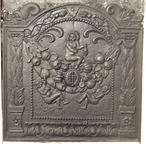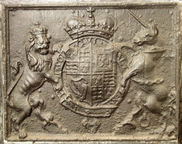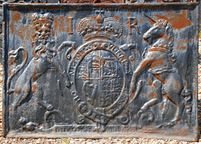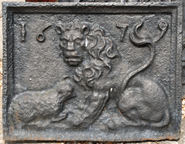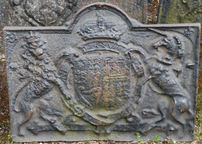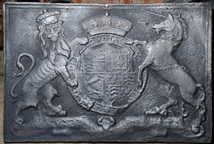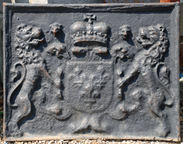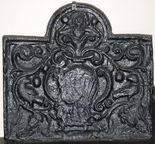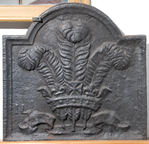-
591
Description: Arched rectangular shaped; cavetto-moulded edging; on each side a column of large overlapping leaves above a pedestal with a single rose; issuing from the top of each column two ribbons, in figure-of-eight with grenade terminals, fly across the arch; within an arched central panel with bead edging three naked children disport about a swag of fruit, with a central pomegranate, suspended from the top of each column; one figure sits on the top, facing right, the other two hang symmetrically from below; along the base is a line of acanthus leaves; on top a sea serpent is curled on each end.
Notes: The design may have been inspired by the paintings of Jan Pauwel Gillemans the younger (1651-1704); he may have worked in London in 1675-8. Another version (no. 575), probably by the same pattern maker, has a central finial on top and different proportioned fruit and figures. Copies of this fireback were advertised in Bratt Colbran Ltd.'s (London) catalogue in the early-20th century.
Copies of this fireback are known.
- Decoration tags:
- 'Dutch' (shape)
- cavetto (edging)
- whole carved pattern
- pictorial
- mythological
- humans
- plants
Manufactured: in the mid- to late-17th century in England.
Current location: Ham House, Richmond, Surrey, England.
Museum number: 1140116 (part of the National Trust museum group)
- Attached to series:
- Carolean 'Dutch' series
-
593
Description: Rectangular, cavetto moulded edging; Stuart royal shield, garter, supporters and crown.
Notes: Four clear vertical plank lines indicate that the pattern for this fireback was formed of a series of boards probably secured by horizontal battens on the rear.
Copies of this fireback are known.
Inscription: HONI SOIT QVI MAL Y PENSE
Arms: English Stuart royal
- Decoration tags:
- rectangular (shape)
- cavetto (edging)
- whole carved pattern
- planklines
- armorial
- royal
- text
Manufactured: in the late-17th century in England.
Current location: Ham House, Richmond, Surrey, England.
Museum number: 1140118 (part of the National Trust museum group)
- Attached to series:
- Stuart royal armorial firebacks
-
604
Description: Arched rectangular with curved shoulders; cavetto-moulded edging (top and sides) with twin scrolls on inside corners, and scalloped bottom edge; armorial; shield (32 quarters), mantling, supporters (bull and crowned lion), coronet, motto, 2 helms and crests (a bear’s head erased and ducally gorged, and a bear and ragged staff).
Notes: The impaled arms appear to be those of the Earldom of Huntingdon. The crests are of Hastings and Dudley, suggesting they are of Henry, 3rd Earl (c.1535-95), and his wife, Katherine (1548-1620), daughter of John Dudley, Duke of Northumberland. She was a child when they married in 1553. This is an incomplete casting, the full version of which includes a bottom panel with a repeated guilloche design. Christie's Masters and Makers Sale, South Kensington, 30 Nov 2010, lot 516 (£4,375).
Copies of this fireback are known.
Inscription: IN VERITATE VICTORIA (illegible, but verified on other castings)
Arms: Hastings, earl of Huntingdon, impaling Dudley
- Decoration tags:
- rectangular with round arch (shape)
- cavetto (edging)
- whole carved pattern
- armorial
Manufactured: in the late-16th century in England.
Current location: not known.
- Attached to series:
- Personal armorial firebacks
-
614
Description: Rectangular; cavetto-moulded edging; English royal Stuart shield, garter, crown, crowned lion and unicorn supporters, and motto; initials split by crown.
Notes: A bold, well-sculpted pattern.
Copies of this fireback are known.
Inscription: I R / HONI SOIT QVI MAL Y PENSE / DIEU ET MON DROIT
Arms: English Stuart royal - James I
- Decoration tags:
- rectangular (shape)
- cavetto (edging)
- whole carved pattern
- individual letters
- armorial
- royal
- text
Manufactured: in the early-17th century in England.
Current location: Mark Ripley Forge & Fireplaces, Northbridge Street, Robertsbridge, East Sussex, England.
- Attached to series:
- Jacobean royal armorial firebacks
- Stuart royal armorial firebacks
-
624
Description: Rectangular; cavetto edging all round; seated lion on right, its tail rising above its back and its head turned to face the viewer; a seated sheep on the left; date split across top.
Notes: Intended to represent the saying, ‘The lion shall lie down with the lamb’, a popular misquotation of Isaiah 11: 6.
Copies of this fireback are known.
Inscription: 1679
- Decoration tags:
- rectangular (shape)
- cavetto (edging)
- whole carved pattern
- individual numbers
- pictorial
- biblical
- text
- animals
Manufactured: in 1679 in the Weald area of England.
Current location: Mark Ripley Forge & Fireplaces, Northbridge Street, Robertsbridge, East Sussex, England.
- Attached to series:
- Small cavetto series
- Old Testament & Apocrypha firebacks
-
633
Description: Arched rectangular shape with small rhomboidal flanges in the corners of the arch; cavetto moulded edge on all sides, with a rose stamp on each curved enlargement of the moulding in the top corners; Stuart royal arms (1605-88, 1702-14) with lion and unicorn supporters, garter, crown and motto.
Notes: A recasting. A casting of the same fireback is in the collection of the Sussex Archaeological Society, but with the addition of a person's name impressed from the broken handle of a skillet (no. 405).
Copies of this fireback are known.
Inscription: [Garter and royal mottoes]
Arms: English Stuart royal
- Decoration tags:
- rectangular with round arch (shape)
- cavetto (edging)
- whole carved pattern
- armorial
- royal
- text
Manufactured: in the late-17th century possibly in the Weald area of England.
Current location: Mark Ripley Forge & Fireplaces, Northbridge Street, Robertsbridge, East Sussex, England.
- Attached to series:
- Stuart royal armorial firebacks
-
304
Description: Rectangular; cavetto-moulded edging; English royal Stuart shield, garter, crown, supporters and motto.
Notes: One of many designs of the Stuart royal arms on firebacks. A recasting, hence the illegible motto. Sold at Christie's Masters and Makers auction, 30 November 2010, lot 517 (£1,875).
Copies of this fireback are known.
Inscription: HONI SOIT QVI MAL Y PENSE / DIEV ET MON DROIT
Arms: English Stuart royal
- Decoration tags:
- rectangular (shape)
- cavetto (edging)
- whole carved pattern
- armorial
- royal
- text
Manufactured: in the 17th century in England.
Current location: Suffolk House Antiques, High Street, Yoxford, Suffolk, England.
- Attached to series:
- Stuart royal armorial firebacks
-
833
Description: Rectangular; cavetto-moulded edging; armorial of France modern in front of a cartouche; above, an English royal crown between two small lion masks; two lion rampant supporters.
Notes: Believed to be associated with the marriage, in 1625, of Charles I with Princess Henrietta Maria of France, the juxtaposition of the arms of France with an English crown is seen on several firebacks, normally with a distinctive ornate edging; on this fireback is the unusual addition of two lion supporters, which are heraldically incorrect.
Arms: France modern
- Decoration tags:
- rectangular (shape)
- cavetto (edging)
- whole carved pattern
- armorial
Manufactured: in the early- to mid-17th century possibly in the Weald area of England.
Current location: Mark Ripley Forge & Fireplaces, Northbridge Street, Robertsbridge, East Sussex, England.
- Attached to series:
- Miscellaneous royal firebacks
- Anglo-French armorial firebacks
-
653
Description: Arched rectangular shape; cavetto-moulded edging; central, two handled, fluted vase with swirled, fruited vines issuing from the neck, and a bird on each side perched within the vines; out of the neck, a naïve human figure with arms outstretched, grasping vines on each side.
Notes: The figure emerging from the vase has a symbolism which has yet to be explained.
Copies of this fireback are known.
- Decoration tags:
- rectangular with round arch (shape)
- cavetto (edging)
- whole carved pattern
- pictorial
- plants
- objects
Manufactured: in the mid- to late-17th century in the Weald area of England.
Current location: Eastgate House, High Street, Rochester, Kent, England.
Museum number: A3496 (part of the Rochester Guildhall Museum museum group)
- Attached to series:
- Gadrooned vase firebacks
-
670
Description: Arched rectangular shape; cavetto edging; three ostrich feathers issuing from a royal coronet; a blank motto banner below; the initials bottom left, above banner.
Notes: The badge of the Prince of Wales; perhaps cast during the Commonwealth period. A copy personalised with added initials.
Copies of this fireback are known.
Inscription: IL
- Decoration tags:
- rectangular with round arch (shape)
- cavetto (edging)
- whole carved pattern
- individual letters
- heraldic
- text
Manufactured: in the mid-17th century in the Weald area of England.
Current location: Rottingdean Grange, The Green, Rottingdean, East Sussex, England.
(part of the Brighton Museum museum group)
- Attached to series:
- Prince of Wales firebacks
- Small cavetto series
